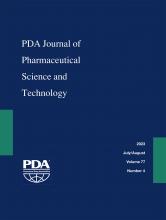Abstract
In the wake of a series of outbreaks of finished pharmaceutical product-related Burkholderia cepacia complex (Bcc) human infections worldwide, the United States Food and Drug Administration (FDA) in 2017, and subsequently in 2021, issued advisory notifications to the pharmaceutical industry for stringent Bcc testing requirements for pharmaceutical manufacturing processes and for finished pharmaceutical products prior to release to the marketplace. The advisory notifications highlight non-sterile aqueous finished pharmaceutical products as being a major culprit associated with many of these human infection events. As such, there has been a significant number of Bcc-contaminated finished product recalls resulting in company revenue losses, delayed finished product release, finished product shortages for patients, and manufacturing plant shutdowns coupled with company reputational damage. With many of the finished product recall events, pharmaceutical grade water and/or manufacturing facility water distribution systems were identified as the primary origin source of Bcc contamination. Testing and monitoring regimes currently employed to identify Bcc contamination of water associated with pharmaceutical manufacturing are often limited by costly, laborious, lengthy, and nonspecific traditional microbial culture-based methodologies. Presently FDA approved, European Conformity (CE) marked, and International Organization for Standardization (ISO) standard microbial culture-independent rapid, quantitative, specific, and sensitive nucleic acid diagnostics (NAD) methodologies are now gaining greater widespread acceptance in their routine usage in testing laboratories. Here we present the development of a rapid (<4 hours from sample in to result out) single test culture-independent Bcc NAD method, incorporating a quantitative real-time polymerase chain reaction (qPCR) assay. This method can be used for the detection and simultaneous identification of all 24 Bcc species currently assigned, directly from water samples. This culture-independent Bcc NAD method is validated to the testing method equivalent of the ISO/TS 12869:2019 standard, which is a widely used rapid culture-independent NAD method for detecting Gram-negative Legionella species in water.
- Burkholderia cepacia complex
- Finished pharmaceutical product recalls
- Non-sterile aqueous pharmaceutical products
- Water for manufacturing
- Culture-independent
- Nucleic acid diagnostics
- Quantitative polymerase chain reaction
- ISO/TS 12869:2019
- © PDA, Inc. 2023
PDA members receive access to all articles published in the current year and previous volume year. Institutional subscribers received access to all content. Log in below to receive access to this article if you are either of these.
If you are neither or you are a PDA member trying to access an article outside of your membership license, then you must purchase access to this article (below). If you do not have a username or password for JPST, you will be required to create an account prior to purchasing.
Full issue PDFs are for PDA members only.
Note to pda.org users
The PDA and PDA bookstore websites (www.pda.org and www.pda.org/bookstore) are separate websites from the PDA JPST website. When you first join PDA, your initial UserID and Password are sent to HighWirePress to create your PDA JPST account. Subsequent UserrID and Password changes required at the PDA websites will not pass on to PDA JPST and vice versa. If you forget your PDA JPST UserID and/or Password, you can request help to retrieve UserID and reset Password below.






